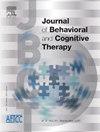Cross-cultural adaptation and psychometric properties of the Cognitive Behavioral Avoidance Scale- CBAS in Brazilian adults
IF 1.6
Q3 PSYCHIATRY
引用次数: 0
Abstract
Background
Avoidance behavior, defined as a tendency to escape or disengage from negative stimuli, is an important psychosocial component in Major Depressive Disorder (MDD), related to its maintenance and severity.
Objective
The importance of measuring this variable to enhance results in clinical interventions, this study realized a cross-cultural adaptation of the CBAS into Brazilian-Portuguese (CBAS-BR) and investigated its psychometric properties in clinical and non-clinical samples.
Methods
After the translation-back translation process by an expert committee review, the CBAS-BR was applied to a total of 310 adults (67 with major depressive disorder; 243 healthy controls). The Beck Depression Inventory-II (BDI-II), Montgomery–Åsberg Depression Rating Scale (MADRS), and the Depression Thought Scale (DTS) were also applied. Internal consistency (Cronbach’s α, McDonald’s ω), confirmatory factor analysis (CFA), and convergent validity were examined.
Results
The original four-factor structure (Behavioral Social, Behavioral non-social, Cognitive Social, and Cognitive non-social) showed excellent fit (CFI = 0.981, TLI = 0.979, RMSEA = 0.046, 90 % CI = 0.039–0.053 [p = 0.85]). Internal consistency was high for the total scale (Cronbach’s α = 0.96; McDonald’s ω = 0.96) and for each subscale (α = 0.86–0.92). The CBAS-BR has moderate to strong correlations with the DTS, BDI II, and MADRS, supporting convergent validity.
Conclusions
The CBAS-BR is a reliable and valid measure for assessing cognitive-behavioral avoidance in Brazilian adults. It’s expected that its use may contribute to detecting maladaptive avoidance patterns and to proposing more targeted activation strategies to reduce symptoms or relapses in MDD.
巴西成人认知行为回避量表的跨文化适应和心理测量特征
逃避行为被定义为逃避或脱离负面刺激的倾向,是重度抑郁症(MDD)中重要的社会心理组成部分,与其维持和严重程度有关。目的通过对巴西-葡萄牙语(CBAS- br)的跨文化调整,研究CBAS- br在临床和非临床样本中的心理测量特性。方法经专家委员会审核后,将CBAS-BR应用于310例成人(重度抑郁症患者67例,健康对照243例)。采用Beck抑郁量表- ii (BDI-II)、Montgomery -Åsberg抑郁评定量表(MADRS)和抑郁思维量表(DTS)。检验内部一致性(Cronbach’s α, McDonald’s ω)、验证性因子分析(CFA)和收敛效度。结果原四因素结构(行为社会、行为非社会、认知社会、认知非社会)拟合良好(CFI = 0.981, TLI = 0.979, RMSEA = 0.046, 90% CI = 0.039 ~ 0.053 [p = 0.85])。总体量表(Cronbach 's α = 0.96; McDonald 's ω = 0.96)和各子量表(α = 0.86-0.92)的内部一致性较高。CBAS-BR与DTS、BDI II和MADRS有中强相关,支持收敛效度。结论CBAS-BR是一种可靠、有效的评估巴西成人认知行为回避的方法。预计它的使用可能有助于发现适应不良的回避模式,并提出更有针对性的激活策略,以减少重度抑郁症的症状或复发。
本文章由计算机程序翻译,如有差异,请以英文原文为准。
求助全文
约1分钟内获得全文
求助全文
来源期刊

Journal of Behavioral and Cognitive Therapy
Psychology-Clinical Psychology
CiteScore
3.30
自引率
0.00%
发文量
38
审稿时长
60 days
 求助内容:
求助内容: 应助结果提醒方式:
应助结果提醒方式:


